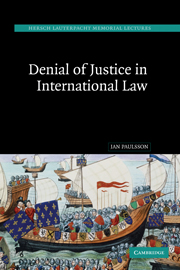Book contents
- Frontmatter
- Table of Contents
- Acknowledgements
- Authorities
- Abbreviations
- 1 The renaissance of a cause of action
- 2 The historical evolution of denial of justice
- 3 Three fundamental developments
- 4 The modern definition of denial of justice
- 5 Exhaustion of local remedies and denial of justice
- 6 Denial of justice by outside interference
- 7 Denial of justice by the decision-maker
- 8 Remedies and sanctions
- 9 The menace of ‘obscure arbiters’?
- Bibliography
- Index
3 - Three fundamental developments
Published online by Cambridge University Press: 29 July 2009
- Frontmatter
- Table of Contents
- Acknowledgements
- Authorities
- Abbreviations
- 1 The renaissance of a cause of action
- 2 The historical evolution of denial of justice
- 3 Three fundamental developments
- 4 The modern definition of denial of justice
- 5 Exhaustion of local remedies and denial of justice
- 6 Denial of justice by outside interference
- 7 Denial of justice by the decision-maker
- 8 Remedies and sanctions
- 9 The menace of ‘obscure arbiters’?
- Bibliography
- Index
Summary
State responsibility for the conduct of the judiciary
Long ago, some authors – and indeed tribunals – argued that it would be wrong to hold a government liable for the conduct of courts having a constitutional mandate to operate independently. Since the government could not, in principle, dictate the conduct of national judges, their acts should not be attributed to the government; unlike the executive and the legislature, they should not be taken to ‘represent the expression of its will’. Thus, the Senate of Hamburg, when adjudicating the case of Yuille, Shortridge & Co., a British claim for private losses suffered as a consequence of a Portuguese judgment, declared in its award in 1861 that it would be ‘altogether unjust’ to require the Portuguese government ‘to answer for the misconduct of its courts’ since the Portuguese constitution decreed the courts to be ‘completely independent of the Government and the latter was consequently unable to exert any influence over their decisions’.
Whatever significance may be attributed to the independence of the judiciary as a matter of internal law, the notion that courts could somehow be separate from their states is unacceptable internationally. As Professor Charles Dupuis wrote in 1924: the state is ‘no more entitled to disavow the law of nations by using judicial authority than by a fancy of Parliament or by outrageous conduct of the government’.
- Type
- Chapter
- Information
- Denial of Justice in International Law , pp. 38 - 56Publisher: Cambridge University PressPrint publication year: 2005



